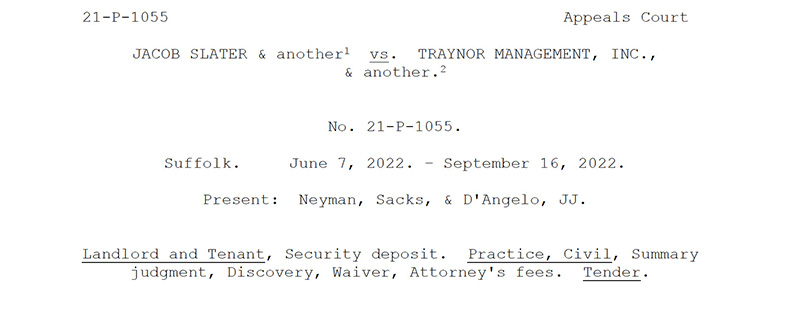Landlord Held Responsible for Treble Damages and $17,000 in Attorneys’ Fees After Botched Security Deposit Handling
. Posted in News - 0 Comments
By Kimberly Rau, MassLandlords Inc.
A misstep with two roommates’ shared security deposit in 2020 has left one landlord on the hook for thousands of dollars in damages and attorneys’ fees, some of the largest we’ve seen awarded for a security deposit case.
The worst part: most, if not all, of this could have been avoided.

Traynor Management lost its initial case against Jacob Slater and his roommate, and also lost its appeal. This security deposit mishandling case ended up costing them tens of thousands of dollars in damages and attorney’s fees. [Image License: Public Domain]
Background on the Case
According to court documents, in 2018, Jacob Slater and Nicholas Alessi began renting a unit in Boston managed by Traynor Management Company. In 2019, they renewed the lease. It then expired on Aug. 31, 2020. The security deposit was $2,425.
After moving out, Slater contacted his landlord, Wendy Traynor, inquiring about the return of the security deposit. Traynor sent a text message back stating that the facilities manager for the apartment had to confirm there was no damage, but that she wasn’t concerned. She asked for forwarding addresses for the two men, which Slater said he would email to her. Traynor states that the apartment was reviewed on Sept. 15, 2020, and had no damage.
What happened next is disputed between Slater and Traynor. Traynor said she called Slater and said he could meet her at the management office to get his check, even though the office was closed at that point due to Covid-19.
Slater denies receiving any such call. He later sent a text message to Traynor on Sept. 23 asking about the deposit. He said he had sent her an email with both his and Alessi’s addresses, but hadn’t heard back. Slater then sent the information again, providing his address in New York, as well as Alessi’s, elsewhere in Massachusetts. Traynor replied, “End of Sept.”
On Sept. 30, Slater had not received the deposit. He sent another text asking about it, which went unanswered. He retained an attorney on Oct. 28, 2020.
Legal Proceedings
Slater’s attorney sent a demand letter to Traynor. The letter sought the security deposit, trebled, along with $363.75 in interest and $1,250 in attorneys’ fees, an amount totaling $8,888.75. The landlord’s attorney sent separate checks, one for Slater and one for Alessi. Each was for half of the original deposit and some interest. There was no payment of treble damages or attorneys’ fees. Court documents state additional negotiations failed, and the case ended up in housing court.
Once in housing court, counsel for the landlord attempted to have the complaint dismissed, counterclaimed abuse of process, and “conducted considerable discovery.” The discovery motion sought to investigate all surrounding statements made in the original demand letter.
To see a landlord requesting a discovery motion in a housing court case is somewhat unusual. Typically, a motion for discovery is made by a tenant who wants to extend or delay proceedings, or get more information on possible landlord wrongdoing. In this case, the tenants’ attorney requested summary judgment after conducting minimal discovery on their own.
The judge, Justice Irene Bagdoian, denied the landlord’s discovery motion, determining that allowing the motion would not produce “any relevant material evidence.” She ruled that the landlord violated the security deposit law by not returning the deposit within 30 days of the termination of tenancy. She awarded the tenants treble damages ($7,275), plus interest, costs and attorneys’ fees, which at that point were at $17,780.
The Landlord’s Appeal
The landlord moved for reconsideration, arguing that she had called Slater on Sept. 20 to tell him he could come to the office to pick up the deposit. The judge stated that was irrelevant. The law gives landlords 30 days to return the deposit, not attempt to return it. Traynor appealed, but the decision was upheld.
“The law is clear that where, as here, there are no permissible deductions from the security deposit, the entire deposit plus interest must be returned within thirty days after the end of the tenancy, and the failure to do so entitles the tenant to treble damages and attorney's fees,” the appeals document stated.
The appeals document also noted that, as Slater was living in New York at the time, requesting he return to Boston to pick up a check would be quite an inconvenience. (This was also during the height of Covid-19, when many were avoiding interstate travel.)
In the decision, the court cited Goes v. Feldman (1979), which discussed what it means to return money in Massachusetts. "[T]o constitute a valid tender the money must be actually produced and offered to the person who is entitled to receive it... A mere offer to pay or a statement that the party has the money and is ready and willing to pay, without actual production of it, is not sufficient to constitute a valid tender.”
What if a renter refuses? The court addressed that as well, citing Henry v. Bozzuto Mgt. Co. (2020). Money can be validly tendered even if the renter refuses to accept it. The key is the money must be held out for the taking, mailed or otherwise put at the renter's disposal.
The attorneys’ fees were reviewed during the appeals process, and, while unusually high, were determined to be valid. They were mostly due to the demands the landlord’s attorney had placed.
“[The tenants' counsel] claims that he devoted 59.40 hours of time to this matter, which – on its face – seems extraordinarily high for a security deposit case,” Bagdoian wrote.
“Nonetheless, after examining the time records of the [tenants'] attorney and noting the extraordinary amount of work which he was obliged to do on account of the demands of the [landlord's] defense strategy, the court finds that the time spent was reasonable.”
Commentary
We had three attorneys bring this case to our attention, and all agreed that things could have been handled better by the landlord.
“I think this was a bad move on the part of the landlord,” wrote attorney Jordana Roubicek Greenman. “As a landlord advocate, I often require that a security deposit be returned prior to being engaged if there is any question at all on proper handling. This landlord's refusal to acknowledge the error has now resulted in additional adverse case law. I believe the attorneys' fees are unfortunate but the statute is clear.”
Attorney Adam Sherwin agreed. He stated the importance of good communication, getting forwarding addresses early, and following the law closely.
“Don’t take risks,” he said. Sherwin added that the law isn’t clear if checks must be received within 30 days, or simply mailed within that timeframe, to be in compliance. “Get checks in the mail as quickly as possible.”
Attorney Peter Vickery noted that this case highlights the dangers of taking such risks with security deposits. Even if you win, it’s going to be expensive.
“The case shows the enormous risks involved in taking – and litigating over – a security deposit,” Vickery said. “If the landlord loses, the tenant's legal fees together with interest will be much bigger than the security deposit. Even if the landlord prevails, the landlord's own legal fees will be bigger than the security deposit, making it a Pyrrhic victory.”
Conclusion
Massachusetts takes security deposit violations seriously. In this case, the attorneys’ fees are particularly hefty. They could have been avoided had the management company not tried to argue immaterial facts in court.
We recommend all landlords read our articles about how to properly handle security deposits. If you are unsure how to proceed, we recommend you consult with your attorney before things go past the 30-day deadline and get out of hand. It could save you a lot of time and money.




